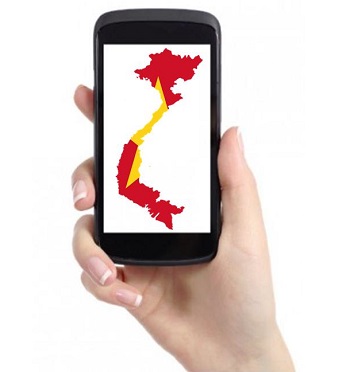Mobile shopping is outpacing traditional e-commerce channels in terms of growth
Mobile commerce is gaining momentum is growing markets. In Vietnam, more consumers are beginning to use their smartphones to make purchases rather than their conventional computers. PC-commerce is shrinking at a slow rate, with the mobile space thriving as more retailers begin to offer mobile-centric services. Lazada, the largest e-commerce company in Vietnam, expects the mobile space to continue growing, noting that the majority of its business now comes from mobile shoppers.
Lazada has high hopes for its mobile shopping endeavors
According to Lazada, approximately 60% of its sales come from mobile shoppers. The company has taken note of an aggressive rise in the demand for mobile shopping support and Lazada is working eagerly to engage consumers and satisfy this demand. In 2015, about 45% of the transactions that were made through the Lazada website came from mobile devices. Lazada expects that this will grow to 65% by the end of this year as more consumers use their smartphones and tablets to shop online.
Consumers in Vietnam consider mobile shopping to be convenient and effective
 Mobile shopping is growing quickly throughout the Asian market, with smartphone penetration accelerating significantly. In Vietnam, consumers are finding that shopping with their mobile devices is more convenient and, in some ways, more secure. Retailers are embracing this trend, allowing consumers to shop on their websites with their smartphones. Notably, many consumers prefer to use web browsers rather than applications, as browsers provide them with a more enjoyable shopping experience.
Mobile shopping is growing quickly throughout the Asian market, with smartphone penetration accelerating significantly. In Vietnam, consumers are finding that shopping with their mobile devices is more convenient and, in some ways, more secure. Retailers are embracing this trend, allowing consumers to shop on their websites with their smartphones. Notably, many consumers prefer to use web browsers rather than applications, as browsers provide them with a more enjoyable shopping experience.
Mobile commerce will likely continue seeing strong growth in Vietnam
Mobile commerce has had a major impact on the overall e-commerce market in Vietnam. Many retailers have begun engaging the mobile space, hoping to find more success by supporting mobile shoppers. There are more than 20 million smartphone users in the country, which represents approximately 24% of Vietnam’s populace. Most of these consumers are between the ages of 18 and 35 and are quite comfortable with the concept of mobile shopping.
A new ACI Worldwide report has shown that there are two major priorities for these payment apps.
The results of a new ACI Worldwide survey have now been released and, within them, it has been revealed that retailers considering mobile wallet apps are most interested in two major issues: security and the ability to use rewards programs.
That said, between those leading issues, it is the mobile security features that tops the list.
Among the retailers who responded to the survey, two out of every three said that the security aspect of mobile wallet apps is their leading concern. This demand from retailers for mobile payments solutions that provide adequate security should help to assuage some of the concerns that consumers have also expressed with regards to adopting these new types of transaction technologies.
That said, beyond security, there were a number of other expectations retailers had for mobile wallet apps.
 Seventy two percent of the surveyed retailers said that security was their top issue for their mobile commerce apps, in general, but when it came to payments, that figure rose to 75 percent. However, just slightly less – 71 percent – said that they wanted the integration of loyalty options into m-commerce apps, while 55 percent were concerned about that issue with mobile payments apps. Another 55 percent said it was important to be able to achieve seamless ordering through the use of the shopping applications but for wallet apps, that was seen as important only among 46 percent of the respondents.
Seventy two percent of the surveyed retailers said that security was their top issue for their mobile commerce apps, in general, but when it came to payments, that figure rose to 75 percent. However, just slightly less – 71 percent – said that they wanted the integration of loyalty options into m-commerce apps, while 55 percent were concerned about that issue with mobile payments apps. Another 55 percent said it was important to be able to achieve seamless ordering through the use of the shopping applications but for wallet apps, that was seen as important only among 46 percent of the respondents.
According to the ACI Worldwide vice president, product line manager, Lynn Holland, in the company’s release on the study, “The proliferation of retail digital channels demonstrates the trend that ‘clicks upstage bricks,’ but even consumers shopping at traditional brick and mortar stores are increasingly using in-store browsing capabilities, which puts the power of information in sales associates’ and consumers’ hands.”
Holland also pointed out that no matter the channel, the results of the research indicated that over m-commerce and mobile wallets, payment security remains a top concern among retailers considering the use of this tech, especially in issues such as point-to-point encryption and tokenization.
 Mobile shopping is growing quickly throughout the Asian market, with smartphone penetration accelerating significantly. In Vietnam, consumers are finding that shopping with their mobile devices is more convenient and, in some ways, more secure. Retailers are embracing this trend, allowing consumers to shop on their websites with their smartphones. Notably, many consumers prefer to use web browsers rather than applications, as browsers provide them with a more enjoyable shopping experience.
Mobile shopping is growing quickly throughout the Asian market, with smartphone penetration accelerating significantly. In Vietnam, consumers are finding that shopping with their mobile devices is more convenient and, in some ways, more secure. Retailers are embracing this trend, allowing consumers to shop on their websites with their smartphones. Notably, many consumers prefer to use web browsers rather than applications, as browsers provide them with a more enjoyable shopping experience.
 Seventy two percent of the surveyed retailers said that security was their top issue for their mobile commerce apps, in general, but when it came to payments, that figure rose to 75 percent. However, just slightly less – 71 percent – said that they wanted the integration of loyalty options into
Seventy two percent of the surveyed retailers said that security was their top issue for their mobile commerce apps, in general, but when it came to payments, that figure rose to 75 percent. However, just slightly less – 71 percent – said that they wanted the integration of loyalty options into 